Earning his Spurs ...
Tottenham Hotspur Grounds Manager, Darren Baldwin, is playing a pivotal role in the club's new stadium and training facilities.
These are exciting times for the North London club as Tom James finds out
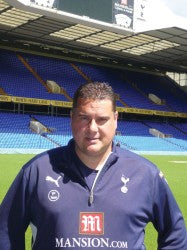 Travel north of the bright red heartland that is Arsenal and a swathe of blue washes London as derby rivals Tottenham Hotspur, the Gunners' understudies for so long, assume dominance on their 'patch'.
Travel north of the bright red heartland that is Arsenal and a swathe of blue washes London as derby rivals Tottenham Hotspur, the Gunners' understudies for so long, assume dominance on their 'patch'.
Just by the White Hart Lane headquarters, the scene is one of fading grandeur - decaying buildings and shop premises, many closed and shuttered as the local team buy up property. This is a township in transition, however, as Spurs join their Premiership counterparts in starting afresh with a brand spanking new stadium that will match any venue in that league.
Are the Hotspurs about to enter a golden era not seen since the league and cup double days of Blanchflower, Jones and Mackay in 1961?
Their original club emblem - the cockerel - that once perched atop the main stand, greets visitors through the main entrance today as a poignant reminder of past glories.
Harry Hotspur, from whom the club is said to take its name, was famed for his riding spurs and fighting cocks, and the sculptured metal icon carries a fearsome prong on its leg to remind us that this is no tame bird.
Another Harry has taken command here of late and, on current performances, is on track to repeat history. 'To dare is to do' - the club motto - seems highly appropriate when speaking of Harry Redknapp.
The rising fortunes of Spurs come at a time when those spearheading turfcare are more prominently positioned than they've ever been. The media is interested in what grounds managers have to say and they are growing more influential at boardroom level.
That burgeoning profile, particularly at the high end of sport, is bringing those that tend the top footballing surfaces into sharp relief as the onus of responsibility spreads and deepens.
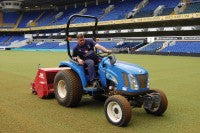 A respect for grounds managers is gathering path though, seen nowhere better perhaps than at Tottenham Hotspur, where that role embraces crucial aspects of management at a club that has gone from bottom of the Premier League to a worthy fourth in just 18 months, landing them a place in the Champions League for the first time.
A respect for grounds managers is gathering path though, seen nowhere better perhaps than at Tottenham Hotspur, where that role embraces crucial aspects of management at a club that has gone from bottom of the Premier League to a worthy fourth in just 18 months, landing them a place in the Champions League for the first time.
Some may argue that, wherever Harry Redknapp hangs his hat, success will follow sooner or later. Man management is his strong suit certainly - the ability to nurture the differing personalities and sensibilities that are the hallmark of a Premiership football squad - so too is a shrewd judgment of his fellow managers' make-up.
But, behind the man, there's the support team that has to deliver the quality of playing surface that players, managers and the public demand.
Charged with that task is 37-year-old Darren Baldwin, whose responsibility it is to oversee White Hart Lane's stadium pitch as well as the increasingly complex training facets of the club.
No stranger to success himself, Darren has previously bagged the Premiership Groundsman of the Year crown and is busy developing a fruitful relationship with both club chairman and manager, whilst also playing a pivotal role in the plans for the club's new stadium and £30m training development now underway north near the M25 orbital motorway.
Darren cut his teeth in the industry at 18 (one's tempted to add 'at only 18' but, in turfcare, it seems grounds professionals leap straight out of the cradle and on to the grass) when he joined the support team at Highbury, after spending a brief stint working for Thames Water on leaving school. After six years with the Gooners, he walked into White Hart Lane in 1996.
"I knew I always wanted to be involved with football," he says, "and, at 18, I realised that it wasn't going to progress at the playing end, so decided to focus on groundsmanship, which I was really drawn to as a career."
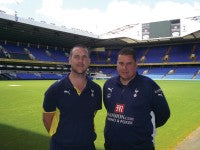
"Joining a Premiership side proved a real baptism of fire though and I soon realised that I'd been thrown into the deep end at a very tender age - something I'm now very grateful for, however."
Working alongside Darren is Jim Buttar - head groundsman at White Hart Lane - who takes over much of the responsibilities of the first team pitch throughout the season. Jim has a deputy and two assistants to aid with the punishing task of maintaining the Desso Grassmaster reinforced pitch.
Paul Jones takes the role as the second of the club's two head groundsmen, his responsibilities resting with the upkeep of the current training grounds at Chigwell, Essex.
So, Darren has overall responsibility of managing and overseeing no less than four separate sites and projects - White Hart Lane, the development of the new training ground (he's in charge of a £10m plus spend), Chigwell and the recently acquired interim training ground at Frenford in Barkingside - the two-year deal signed with the sports club means Darren and the team will also take over the responsibility of maintenance of all the club's sports pitches for the duration of their time there. What a boost for a site in much need of the kind of specialist input that Spurs can bring.
I walked out through the tunnel into blazing sunshine and a most unexpected experience. "Isn't the ground small," I blurted out. Darren laughed. "That's what most people say when they first see the pitch. It's the television camera angles that make it appear so much larger than it is. Everyone used to remark on the size of the old Highbury pitch when, in fact, ours is only an inch shorter."
That said, the 36,000 capacity will swell to more than 52,000 in the new stadium, due to open next door in 2012/13 (subject to planning permission).
With post-season renovation completed just days before, the surface structure of the Desso pitch was clearly visible - neat rows of freshly germinated ryegrass interspersed with sand, and germination sheets still shrouding the shady south end, where, to coin a phrase, the sun refused to shine.
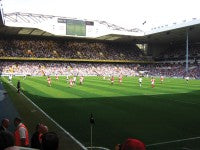 White Hart Lane is not alone in battling the effects of lack of sunlight - many modern stadia, with their arena seating towering above the pitch, suffer similarly.
White Hart Lane is not alone in battling the effects of lack of sunlight - many modern stadia, with their arena seating towering above the pitch, suffer similarly.
"We have to work to produce the best surface we possibly can, regardless of the constraints," says Darren. "That's what we're paid to do, not to get a pat on the back when something goes right. We have to be constantly on the top of our game."
The bulk of the post-season pitch renovation began here on May 12th. Plastic reinforced pitches are now common in Premier League clubs - about half of them are Desso Grassmaster, and nearly all with some sort of synthetic-base.
The plastic blades of grass stitched into the turf keep the ryegrass growing upright and help the root establish itself in the early stages after germination.
The artificial roots are embedded 200mm deep and the grass stitched in at 20mm intervals with seed sown in between - the one rootzone aiding establishment of the other, giving a playing surface less prone to movement and divoting.
The sand construction also allows for much freer drainage, explains Darren - a vital asset for clearing rainfall away swiftly, yet the team have to balance this with the problems of nutrient leaching away from where the natural grass needs it.
To help address the problem, Darren is trialing a new product, a nutrient-rich volcanic rock that holds four times its own weight of water.
"The very nature of Desso pitches means they are free draining but, as a result, we do lose nutrients extremely quickly, so have to work hard to keep the good stuff in the soil," he explains.
"The product was recommended to us by Symbio and formed part of our desire to look down a different avenue. New advancements in playing surfaces throw up fresh challenges, so we constantly have to keep on our toes."
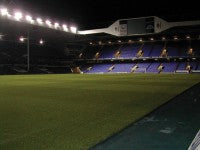
Maintenance of top flight football surfaces is a different animal to other forms of turfcare, Darren believes, with microclimates and the strictures of modern stadia meaning groundsmen are forced to fashion world-class surfaces in conditions largely unsuited to the process - something he knows all too well.
"People just don't realise the huge variables that play their part in maintenance from site to site," he insists. "When I joined from Highbury, I discovered that none of the things that worked for me at Arsenal worked here. I was forced to just go back to basics and learn my new environment."
Disease is also a problem with the mix of climates produced across the pitch, Darren explains. "Under-soil heating, irrigation and warmth from the growing lights all help to produce the perfect conditions for disease to thrive, so we have to be always on our guard."
"We were hit by nematodes a few years back - a problem I'd never experienced before, so it all goes to show that, even when you're doing all the things required at this level, you can't guard against everything, and there's no guarantee that a good pitch can be reproduced year on year to a consistently high standard - something that's often hard for many groundsmen to get across to management."
The differing microclimates at the club's various sites spread out across north London mean that choosing the right seed is no easy feat either, he admits. Mixing it up between several suppliers and adopting an approach of trial and error to discover what works best is the best solution, he believes.
"We now use a combination of Johnson's Stadium, Limagrain and Barenbrug Bar 7, having also trialed new coated seeds earlier this year. Whilst we are enjoying the best germination rates we'd ever seen, we confronted problems with flow rate when we applied the mycorrhizal coating," he explains.
"As the coating is used primarily in golf for overseeding, the problems we experienced with flow would not have been encountered in that sector. Because we seed from scratch, and the flow rate is larger, we found that we needed twice as many passes to apply the same amount as untreated seed."
 "On the training ground, applying three different seed types, each coming out at the same rate, and with the same tractor settings and the same seed size, we still found flow was slightly different every time."
"On the training ground, applying three different seed types, each coming out at the same rate, and with the same tractor settings and the same seed size, we still found flow was slightly different every time."
Many groundsmen would say that Darren is in an enviable position - commanding the ear of the decision-makers at Spurs. "Having the club chairman as a 'go to' is fantastic, and I'm honoured that both him and Harry really listen to what I and my team have to say, and that they respect my opinion and professional judgment," he says proudly.
"It's invaluable for me to know that, if I ask for something and I get told 'no', I can rest easy that its either my fault for not pitching well enough or it's a financial constraint. Knowing no other forces are at work preventing things happening is a good feeling to have for all of us."
Darren's career at the club could have progressed far differently, and he recalls one event in particular that could have stopped it dead in its tracks.
It was back in December 1996, in his first season at Tottenham, during the second half of a game against Liverpool. "Steve McManaman fired a shot that hit a divot right in front of our goalkeeper, costing us a goal and eventually the game. I thought my number was up when I got called to climb the seventy-nine steps up to the chairman's office."
"Luckily, I'd always prided myself on my honesty, and it's been something that's put me in good stead today. It was an unfortunate set of circumstances back then. A new pitch had been laid in July, leaving us only six weeks to get it ready before the new season. It demonstrates just how important good preparation is." Darren and the chairman have enjoyed a good working relationship to this day, something he believes is down to his honest approach. "He knows I'm no yes man and always honest on what I can deliver. If you try to cover things up, they always come out in the end and the result is a loss of respect - the last thing I would want."
Darren's integral role in the Tottenham Hotspur machine has meant he can play a pivotal role in the planning of the new stadium and training facilities. As a part of the multi-million pound redevelopments, the football academy and first team training base will be relocated at Bulls Cross, Enfield, a 20-minute drive from White Hart Lane, with completion of the £30m Green Belt undertaking still two years away.
The planning applications for the new stadium, next door to the present one, were processed in May after the club accommodated a number of the listed building issues on the High Road site as well as the appropriate quantity of housing and retail provision.
"We're currently working alongside the architects to resolve some of the lighting issues with the initial plans," Darren says. "Our problem with having such a big stadium is our ground footprint. We have only a very narrow strip to work with, so the new stadium will have to be built upwards." A staggering 28m higher than currently, in fact.
"The grounds team has been looking into a number of solutions that may help us with some of these high roof issues, with plans to incorporate built-in fans into the track that will replicate a breeze across the pitch, making up of for some of what's lost naturally.
"Disease-wise, fusarium will be our biggest problem," states Darren, who confirms that the pitch will almost certainly be another Desso. "There will also be environmental issues to take into account such as recycling rainwater and irrigation, which will also help reduce the volume we leach - by creating a mycorrhizal 'tray', we hope to create a base of nutrients that will continue to feed the turf."
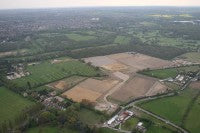 The Bulls Cross development will see the club take ownership of its training facilities for the first time in its 128-year history. "Over the last fifteen years, things have changed and now top clubs are much more conscious of owning and developing their training facilities to replicate a match day pitch," Darren argues. "Before this, training facilities were largely just functional and not so highly developed."
The Bulls Cross development will see the club take ownership of its training facilities for the first time in its 128-year history. "Over the last fifteen years, things have changed and now top clubs are much more conscious of owning and developing their training facilities to replicate a match day pitch," Darren argues. "Before this, training facilities were largely just functional and not so highly developed."
The new facility, due to be opened for the 2012 season, will feature a mix of sand based, Desso and Fibrelastic pitches for the first, reserve and academy teams. No fewer than twenty-three staff will work permanently on site, including a mechanic, irrigation engineer, secretary, head groundsman, and head gardener.
A real green dimension permeates the project, with a recycling plant, Waste2Water washpad facility, two 236,000 irrigation tanks fed by two newly drilled boreholes, as well as a conservation area and a large programme of new plantings aimed to create a grand 'manor house' style entrance.
An attenuation lake will hold water ready for outflow at the rate designated by the Environment Agency, Darren explains. 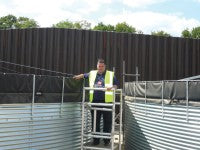
Still only 37, Darren is relishing the challenge the new projects bring him, adding that a job on this scale involves nothing less than a labour of love. "The workload does take its toll and you never stop worrying about it," he admits. "We have to continually adapt and look to new ways to address issues."
He still has time to take a keen interest in groundsmanship at all levels of the game - he is a judge for the FA awards for best non-league groundsman - a role he says is always rewarding. "I find the story is the same in the non-leagues. Teams are often working on tight budgets, with limited machinery, but still producing high standards - this year particularly so," Darren explains.
"Also, I never fail to pick up a few tips on my travels; they really show how you can improvise with machinery, allowing one piece of kit to do a number of jobs. One of the best examples of this was a guy that had converted a cylinder mower to incorporate a brush at the front, which allowed him to get the maximum cutting height before mowing - a very clever use of limited equipment."
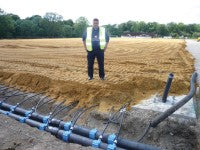 Being involved in such projects highlights, for Darren, just how fortunate a position he and his team are in, and he's passionate about aspects of the business that he feels need some serious changes, believing that the industry continues to be blighted by too many people who prefer to moan about their issues rather than do something about them.
Being involved in such projects highlights, for Darren, just how fortunate a position he and his team are in, and he's passionate about aspects of the business that he feels need some serious changes, believing that the industry continues to be blighted by too many people who prefer to moan about their issues rather than do something about them.
"I help arrange twice yearly grounds managers' meetings, with the aim of getting as many of us together to discuss our issues, share ideas and brainstorm different methods.
"In the past, I've had calls after the event from people with concerns who weren't willing to turn up to these events. We have to help ourselves in this industry, if we don't work together, we'll be all the poorer for it."
